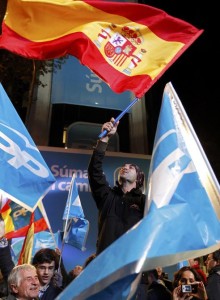
Mariano Rajoy’s resounding election win has redrawn Spain’s political map and put his Popular Party (PP) firmly in control of the country after seven-and-a-half years of Socialist government.
He could hardly face a more difficult task on being voted prime minister. In the days leading up to the election, Spain’s economy was being battered by the markets, with its bond prices close to those of beleaguered Italy. Italy hopes it has just overcome its own political upheaval; Spain’s situation is less clear-cut.
Spanish law dictates a lengthy hiatus between a prime minister’s election win and his instatement. José Luis Rodríguez Zapatero’s successor as prime minister was not due to be sworn in until mid-December. That kind of delay under the current circumstances looks potentially dangerous, with a month’s worth of top-level political dallying being exactly what Spain doesn’t need right now.
Rajoy himself has not made a name for himself as a politician of decisiveness or bold leadership. At times throughout his tenure as PP leader he has even looked like losing control of his party. Right now is the time for him to prove he can move fast and decisively.
The economic future of Spain and Europe is uncertain, but an element of stability can be introduced. Firstly, if bringing Rajoy’s instatement forward is not a possibility, the Socialists and PP need to agree on any measures that should be taken before he becomes prime minister. Also, Rajoy needs to end the coyness he displayed throughout the campaign regarding the economy by announcing his Cabinet and making clear how exactly he intends to ensure the 2012 deficit will be on target.
“There’ll be no cuts to pensions, health or education,” the PP’s Gustavo Arístegui told the BBC after Sunday’s win. Will that really be the case? It’s time for his boss to tell us.
Leave a Reply
You must be logged in to post a comment.